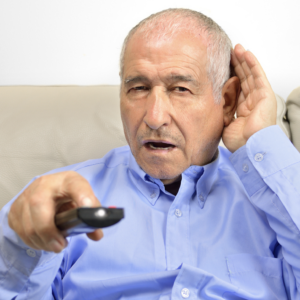Listen Closely: Challenges And Opportunities With Hearing Aids

Listen Closely: Challenges And Opportunities With Hearing Aids
February 28, 2024
As we approach World Hearing Day on March 3, it’s valuable to know that if you suffer from hearing loss, you are certainly in good company. Over 5% of the world’s population has hearing difficulties significant enough to benefit from hearing aids, and this number is expected to double by 2050, to over 700 million people worldwide, or one out of every 10 people. But only a small fraction of people use a hearing aid, despite the large number of people who could benefit. Whether due to cost, access, stigma, or ignorance, so many who could gain access to better hearing suffer from what the World Health Organization calls this “invisible disability.” And the problem of hearing loss is even more acute among older populations. To read previous agebuzz posts on hearing loss, cup your hand over your ear and click here.
Research is ongoing as to the causes of hearing loss and the benefits of hearing aids, not only to improve hearing abilities but to also reduce the risk of dementia or cognitive decline that can result as a consequence of hearing loss. Regarding the causes, we’ve previously addressed such issues as damage to the tiny hair cells in the ear due to noise exposure, medications, chronic illness, ear changes due to aging, etc. Now scientists appear to have zeroed in on zinc levels in the inner ear. In a new study published in PNAS, researchers raise the hope that current mouse studies will someday lead to a treatment to target the excess zinc that occurs as the result of noise damage and potentially causes hearing loss. You can read more about this study here.
Other new studies point to the mounting evidence that hearing loss raises the risk of cognitive impairment or dementia. A new study out of the University of Southern Denmark, published in JAMA Otolaryngology, provides further evidence of this link. In this study, using data from over 500,000 participants (the largest study of its kind to date) scientists found that those who experience hearing loss have up to a 13% higher risk of developing dementia than those with normal hearing. This is especially so in people experiencing severe hearing loss. The risk was even higher for those who did not wear a hearing aid to mitigate their hearing loss. This clear correlation between hearing loss and dementia risk is just one more reason why those who experience hearing loss should treat it. Plus, there’s research underscoring the possibility that the use of a hearing aid in those with hearing loss can lower their risk of mortality.
Yet even though hearing aids can now be purchased over the counter without a prescription in the United States, that doesn’t mean the solution to address hearing loss is readily available to all. Medicare still doesn’t cover the cost of hearing aids, whether prescription or over-the-counter (though you can now get a Medicare-reimbursed annual audiologist exam to assess your ongoing hearing loss). And many of us, for reasons of stigma or just the gradual erosion of our hearing, don’t even realize the extent of our hearing loss or are not aware of ways to assess our hearing capabilities on our own.
Health journalist Judith Graham recently raised additional challenges faced by those who may want to try a hearing aid. She reports that even among those inclined to use a hearing aid, the challenge of manipulating and maintaining these tiny objects can be insurmountable. For example, many models are too tiny or too technologically sophisticated for older users to comfortably and capably maneuver them. She suggests a range of options to make it easier to use your hearing aids and benefit from them, including seeking out the expert advice of an audiologist, even if you purchased over-the-counter aids, looking for hearing aids that have smartphone or external remote controls for easier handling and tweaking, wearing hearing aids every day all day, to give your ears and brain the benefit of adapting to the new sounds you’re taking in, and looking for rechargeable hearing aids so you don’t have to fuss with the tiny batteries needed as replacements.
It’s clear with ongoing and continued research that hearing aids not only benefit your hearing, but your brain functioning as well (in addition to helping with balance and even mortality risk). And for those who still resist, it’s clear that improving your ability to hear can also be a gift for the loved ones who must daily cope with your lack of hearing properly. For one example of “the gift of hearing” you can give to another, read this sweet ode to his wife written by NPR host Scott Simon.







